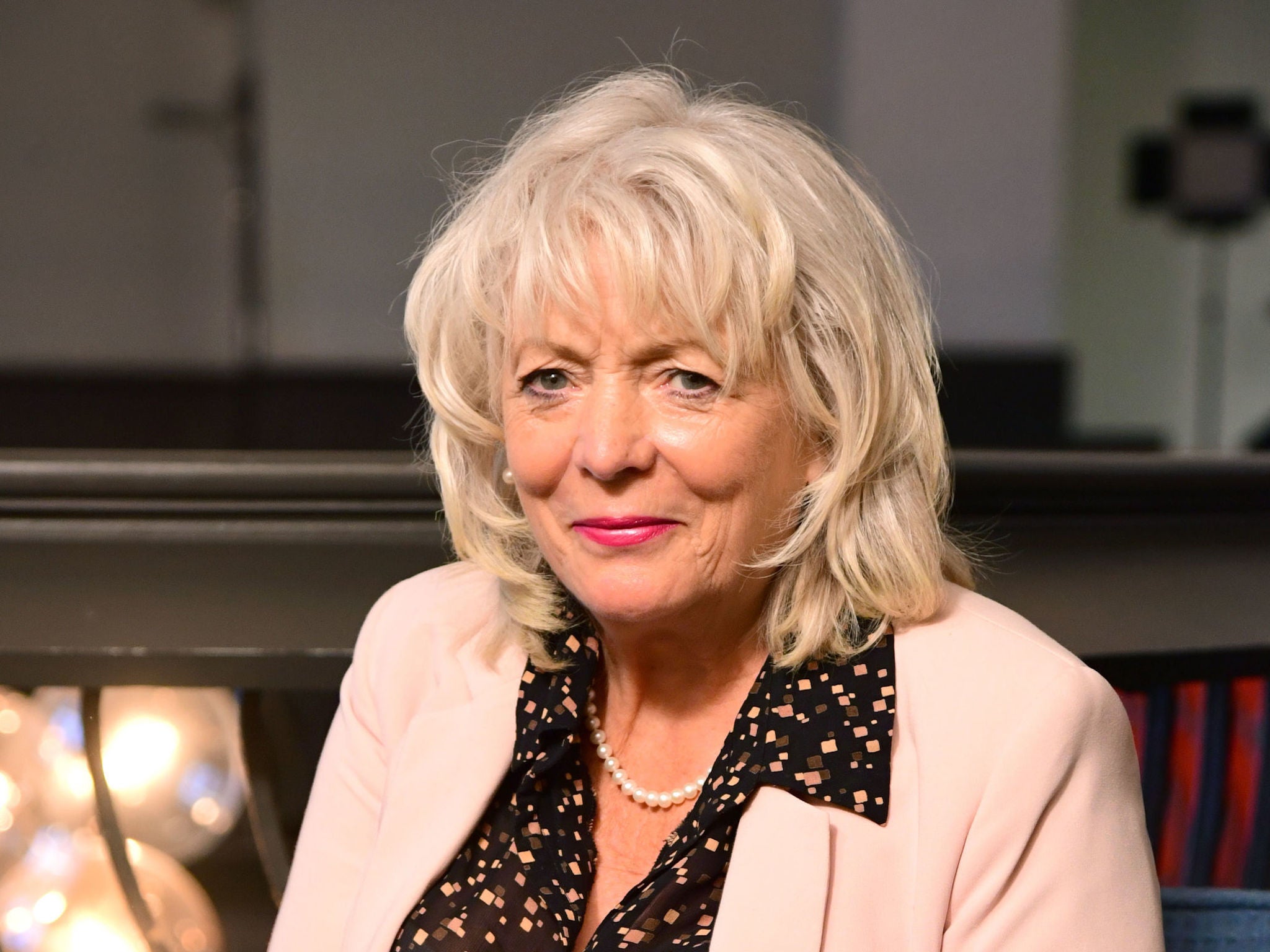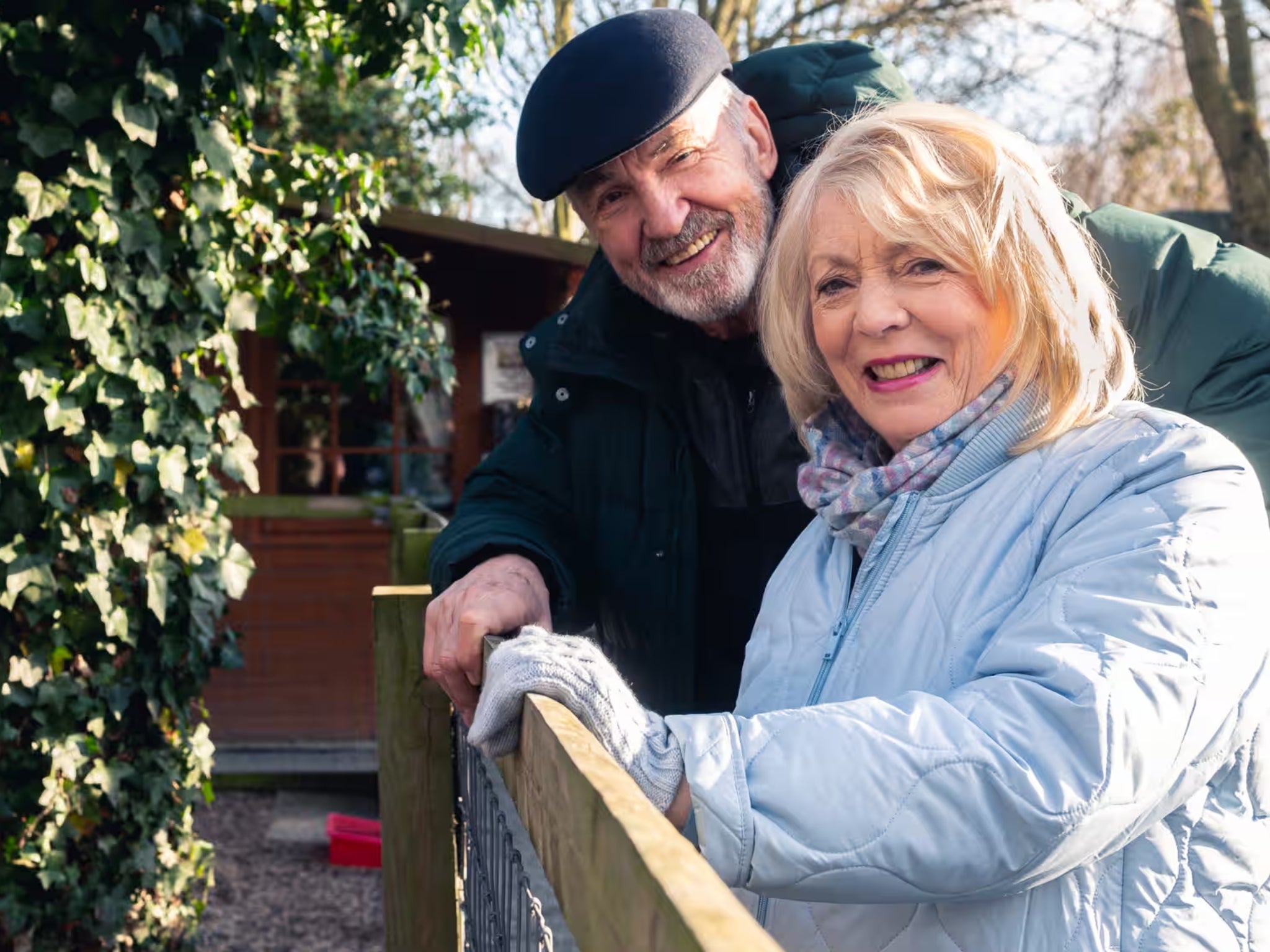Alison Steadman on Gavin and Stacey, relationships, and ageing: ‘Staying friends after divorce wasn’t difficult for me and Mike Leigh’
The ‘Gavin and Stacey’ star tells Kate Mossman about her real-life road trip with Larry to Barry, being Robbie Williams’ nan, staying friends with her ex – and a ‘horrible’ encounter with Harvey Weinstein

A red double canoe sails past the window behind Alison Steadman while she fiddles with her camera on the Zoom. She is at her holiday home in Dorset, which sits on a canal teeming with coots and moorhens. Steadman would be good presenting a nature show: nature is her big passion. In fact she did once, she points out, in the Eighties – the Channel 4 science programme Nature In Focus, in which she played a woman called Helen who led her small boy around and encouraged him to look under pebbles. “I would say, “Oh, look at that ant,’ then he’d go, ‘What?’ and I’d say, ‘No, look at it, it’s fascinating.’” It looks deadpan written down but in person, she radiates enthusiasm.
Steadman is one of our most distinctive actresses, instantly recognisable and effortlessly familiar. The paradox is that she has built a career as a character actor, including her winning role as Pam in the much-loved BBC sitcom Gavin and Stacey. In her new show, however, she plays herself, reuniting with her Gavin and Stacey co-star Larry Lamb for Alison and Larry: Billericay to Barry, a road trip travelogue in which the two Essex parents of TV’s Gavin and Stacey drive between their fictional home and that of their son’s fiancée in a Volvo rechargeable car.
It has had some poor reviews: one pointed out a surprising lack of chemistry between the pair. Driving shows require spontaneous chat and improvisation, of which Steadman is queen (she was, of course, Mike Leigh’s star and wife for many years). Yet it is a shyer, more restrained Steadman who rides shotgun and sips a wine for each of Lamb’s non-alcoholic gins in the gastropubs of Harpenden. Is it difficult, improvising “as herself” as opposed to in character?
“[Being myself] takes a little bit of getting used to,” she admits. “I can remember when I was first interviewed on radio, I was so nervous I could hardly speak. When I first started doing television [in the early 1970s, including the BBC’s Plays for Today] I was very aware of the camera and wished it wasn’t there. Then one day I said to myself, ‘What do you mean, you wish the camera wasn’t there? If the camera wasn’t there, you wouldn’t have a programme!’” Most of Steadman’s big challenges – like her fear of flying – seem to have been overcome by giving herself a metaphorical slap. “But I’ve never been on the London Eye,” she says: she suffers from terrible vertigo. “I just cannot do that. I went up the Eiffel Tower and I was just in a total panic.”
The only unexpected challenge of filming a British road trip was that she couldn’t share the driving: she’d had an operation on her left hand for Dupuytren’s contracture, a stiffening of the palm which causes the fingers to bend, and had to keep the splint out of shot. She’s just had three months off – her first big break in years – during which she turned down a couple of bits of work. “Oh, but I’m not stopping! My problem is I’m 77 at the end of this month. I used to be able to learn lines like that” – a snap of the fingers – “but my brain is slowing down. I’m worrying, you know – I’m keeping going, but I’ve got to do less than I did.”
One thing she didn’t turn down was the upcoming Robbie Williams biopic, Better Man, directed by Michael Gracey, in which Robbie is represented by a cartoon monkey. Steadman does a cameo as his nan. Is she a monkey too? “No, I am not a monkey,” she says. “I met the director on Zoom. He showed me a sequence they’d shot as a taster, and there it was, this monkey as Robbie. It sounds odd but it kind of worked. I got to go to Melbourne, and I met Robbie a couple of times.” Was he like you imagined him to be? “Yeah. Cocky but fun. He said, ‘Playing me nan, are you? I loved me nan. Did you love your nan?’”
Steadman grew up in a rented 1930s property in Anfield, close to the football stadium and half an hour’s drive from Paul McCartney’s council house on Forthlin Road. (She once followed all four Beatles to the local post office, where they were filling in passport applications: McCartney signed a piece of paper for her, then added the word “Beatles” underneath.) At eight, she heard a teacher’s husband tell her mother she was good enough to be an actress, after a turn in the school play, which is when she first realised actor was a job, like a milkman. She’d do accents and fancy voices for her mother’s amusement, wearing a fox fur stole. And at ten she played a hideous trick with her elder sister’s toothpaste.
“The idea of this toothpaste was, it was red and it would make your gums redder, so it would make your teeth look whiter,” she recalls. “It’s ridiculous, but this was the truth. I did a trickle here,” – she traces the side of her mouth with a finger – “and then I did blood coming out of my eye. I came down the stairs and my parents were sitting watching television, and I thought, ‘I’m going to act this out like I’ve fallen and I’ve smashed my face.’” This does not sound like a young woman who wanted to be an actor because she was captivated by the glamour of the silver screen. “My thing was, I always wanted to be free to do whatever I wanted, you know?” she says. “And luckily, that’s worked out for me.”

Steadman met Mike Leigh in the second year at E15 drama school in Loughton, Essex. It was during college that she’d unconsciously gather inspiration for her “Essex Women”: Beverly from 1977’s Abigail’s Party would mature nicely, through the years, into Gavin and Stacey’s Pam. Her comic roles in Leigh’s films stretched from the extraordinarily drippy Candice-May in “Nuts in May” to the bizarre hairdresser in his award-winning 20-minute film The Short and Curlies, who for no clear reason takes a gasp of air through the mouth before she delivers every line. There was golden age TV – roles in Dennis Potter’s The Singing Detective and Cold Lazarus, and the unforgettable Mrs Bennet in Andrew Davies’ Pride and Prejudice. Though she was never typecast, a Steadman emerged that everyone can visualise, whether she is playing Adrian Mole’s mother or John Cleese’s romantic interest – an exaggerated version of the engaged and mildly surreal person on Zoom today.
She and Leigh, whose two sons are now in their thirties, divorced in 2001. They are still good friends. What is their secret? “We just have always been friends,” she says simply. “It’s difficult sometimes for people, but it wasn’t difficult for us. We’re meeting up next week because it’s my younger son’s birthday, so we’re all having a meal together. You know, we wouldn’t not do that.” Leigh once said that a key to Steadman’s brilliance as an actor is that she is both “soberly sane and totally bonkers”. You can feel, in that description, any of her comforting mother figures with their wildly anxious imaginations. “I wouldn’t think I was bonkers, seriously. I am quite a sort of normal kind of person,” she says, “but I suppose we’ve all got a bit of bonkers in us, haven’t we? I’m not very good on my own: I’m not a loner [she lives with her partner, the actor Michael Elwyn, in Highgate, London]. I’m not someone who enjoys the solitude.” And yet she loves the novels of Anita Brookner – they are lined up on her shelf – with her lonely and isolated women, walking the streets of Chelsea at 10pm. “I wouldn’t do it myself, but I can understand that woman and why she’s doing it, and that kind of inner self,” she says. “She never wrote a word I didn’t believe.”
What does Steadman think has been her greatest professional risk? “The Rise and Fall of Little Voice,” she says (she was part of the original West End cast in Sam Mendes’ 1992 production). “That was a real challenge because when it’s a new play, they often keep rewriting chunks of it, and I kept getting new speeches – it was very hard-going. But when I finally achieved what I wanted to achieve, it was like paradise.” She got an Olivier Award for her role as Mari Hoff, the mother of Little Voice, but was never offered a role in the film. “That was that horrible Harvey Weinstein thing...” she says. Weinstein was producing the film and wasn’t interested in Steadman because she had never broken through in America. “He was ridiculous, horrible. Those kind of guys want someone who’s been offered a Golden Globe. I mean, alright, he didn’t want me in the film, but at least he could have spoken to me.”

She was memorably stuck with Weinstein in a curtained area of the Baftas, waiting to go on, “and he was looking at me like I was dirt on his shoe. Literally, looking me up and down.” She takes a big swig of water from a pint glass and looks rattled. It’s the same look she gives when I ask her about politics, a slight shrivelling of the shoulders. “I just find politics so depressing now. You just want a good person who’s genuine. But I certainly wouldn’t want another term of the Tories in office. I’ve voted Labour all my life.”
In recent years Steadman has balanced softer roles with parts in topical dramas, such as Care (2018) where she plays an elderly mother being looked after by her daughter after a stroke; and Mike Bartlett’s Life (2020), where her character decides to leave an awful marriage in her eighth decade. Even at her lightest and jolliest, she seems to touch on the kind of universal issues that affect us all. She has often called herself an observer, a watcher of people – it’s how any half-decent character actor builds their parts. She may not walk the streets of London at night like Anita Brookner’s women, but she still seems fascinated by the human fauna she observes around her home in Highgate. She is most intrigued, perhaps, by the backwards walker. The backwards walker? “It’s a condition!” she declares with a hint of Mrs Bennet: “Have you ever seen a backwards walker? They have to walk backwards all the time. He’d walk backwards down the escalator; he’d walk backwards wherever he was. He always seemed quite happy doing it, and not stressed or anything.”
‘Alison & Larry: Billericay to Barry’ is available on Gold, while the boxset is available on Sky, NOW, Virgin Media UK and Virgin Media Ireland






Join our commenting forum
Join thought-provoking conversations, follow other Independent readers and see their replies
Comments